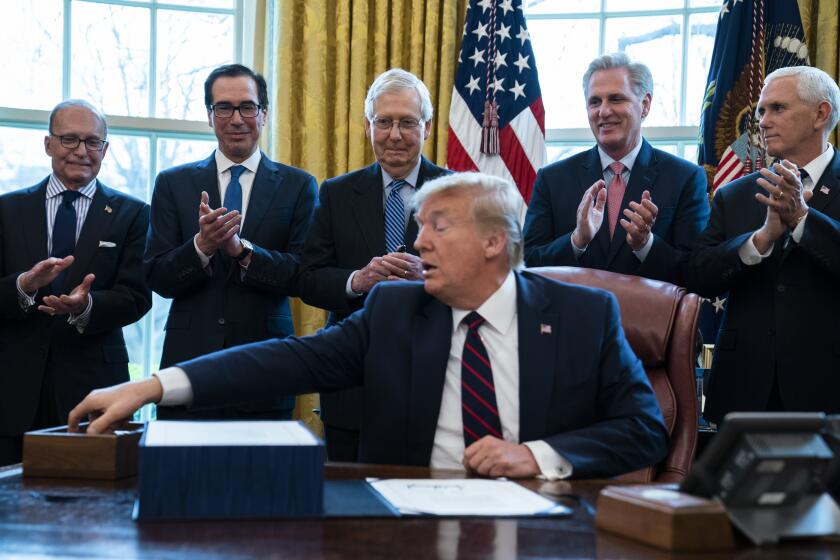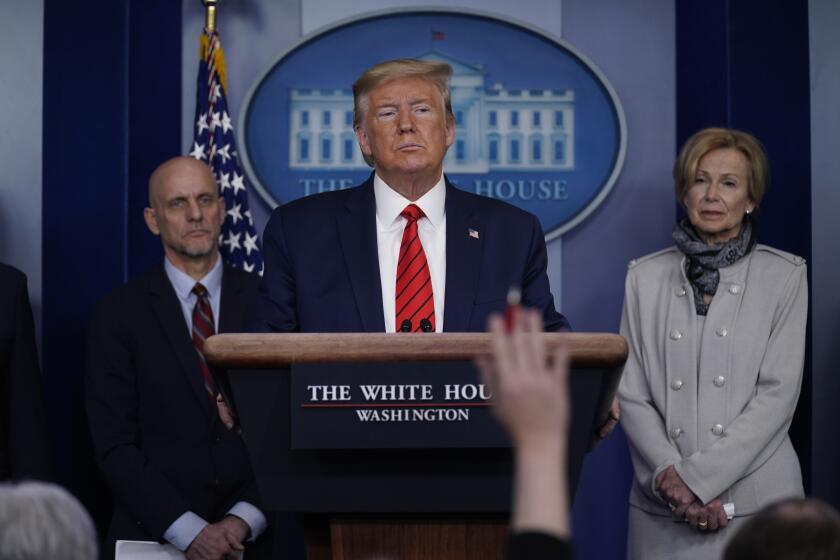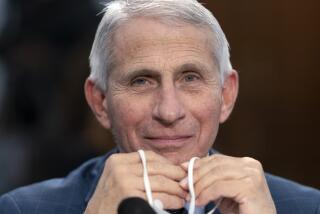Column: The rotten science behind Trump’s chloroquine obsession

- Share via
Jennifer Herrera is down to her last 15 days of a drug she needs to control her inflammatory arthritis. Her pharmacy is out of stock and has no idea when its next shipment will come in.
Her misfortune is that she’s dependent on a version of chloroquine, a drug touted by President Trump and others as a treatment for COVID-19, the disease caused by the novel coronavirus. Pharmacists have been telling patients with arthritis and lupus, an autoimmune condition treated with the drug, that retail supplies are short, if not currently nonexistent. On Tuesday, the Food and Drug Administration placed two formulations of the drug on its list of drug shortages.
‘It’s like the toilet paper shortage. But this is a medication.’
— Arthritis sufferer Jennifer Herrera, on her inability to obtain chloroquine
Reports of the federal stockpiling raised the hackles of the Lupus Foundation and Arthritis Foundation, which have asked Vice President Mike Pence in a joint letter to ensure that their patients aren’t deprived of the medication.
Meanwhile, doctors have been reported to be writing prescriptions for chloroquine for themselves and their families, and prescribing it as an off-label treatment — that is, unapproved by the Food and Drug Administration for the purpose, but legal for doctors to prescribe — for patients facing COVID-19.
“It’s like the toilet paper shortage,” Herrera, 72, told me. “But this is a medication.”
Sanofi, the lead manufacturer of Plaquenil, the hydroxychloroquine formulation Herrera takes, says it doesn’t anticipate shortages of the drug due to COVID-19. Novartis, which makes a generic version of hydroxychloroquine, is donating 30 million doses of its drug to the federal government for stockpiling as a COVID-19 treatment. The company says, however, that it “continues to fill orders at historical levels for existing customers to ensure supply for patients that are most in need.”
Several states have tried to put a leash on diversions of chloroquine preparations. Michigan health officials, for instance, have threatened doctors with “administrative action” for prescribing or stockpiling chloroquine-based medications for themselves or family members without a “legitimate medical purpose.” The state has also advised pharmacists to refuse to fill such prescriptions under those circumstances.
President Trump, Elon Musk and other are spreading dangerous myths about coronavirus.
There are scientific grounds for examining chloroquine and hydroxychloroquine as possible treatments for COVID-19; dozens of clinical trials have been announced. Infectious disease experts consider the drugs to be promising, but there’s a lot more they’d like to know before certifying them for clinical use.
One trial underway at the University of Minnesota aims to recruit 3,000 subjects from among healthcare workers and their household members who have been exposed to infected persons or are showing symptoms or been diagnosed with the disease. Half the subjects will be given chloroquine. Preliminary results may be available by April 21.
Yet generally, the hype has run so far ahead of scientific knowledge that red lights should be flashing and danger sirens sounding.
“We need to be really careful about not jumping the gun here,” Annie Luetkemeyer, an infectious disease expert at UC San Francisco, said in a March 24 video discussion in which she spoke of the need for more study. “We don’t have the data that we need to say that these drugs are effective for treatment or for prevention of the disease.” She warned that it is “premature...to be giving either of these medications widely to people” without knowing more about their efficacy or possible hazards.
Chloroquine is dangerous when not taken under a doctor’s rigorous supervision, and its shortage can cause life-threatening consequences for lupus patients and serious health effects for rheumatoid or inflammatory arthritis patients.
The bottom line is that evidence for chloroquine’s effectiveness in COVID-19 is unsubstantiated. It derives heavily from the work of a controversial French expert in infectious diseases, Didier Raoult, whose studies on the topic have been criticized as inconclusive, but who has been enthusiastically promoting chloroquine as the nearest thing to a miracle drug.
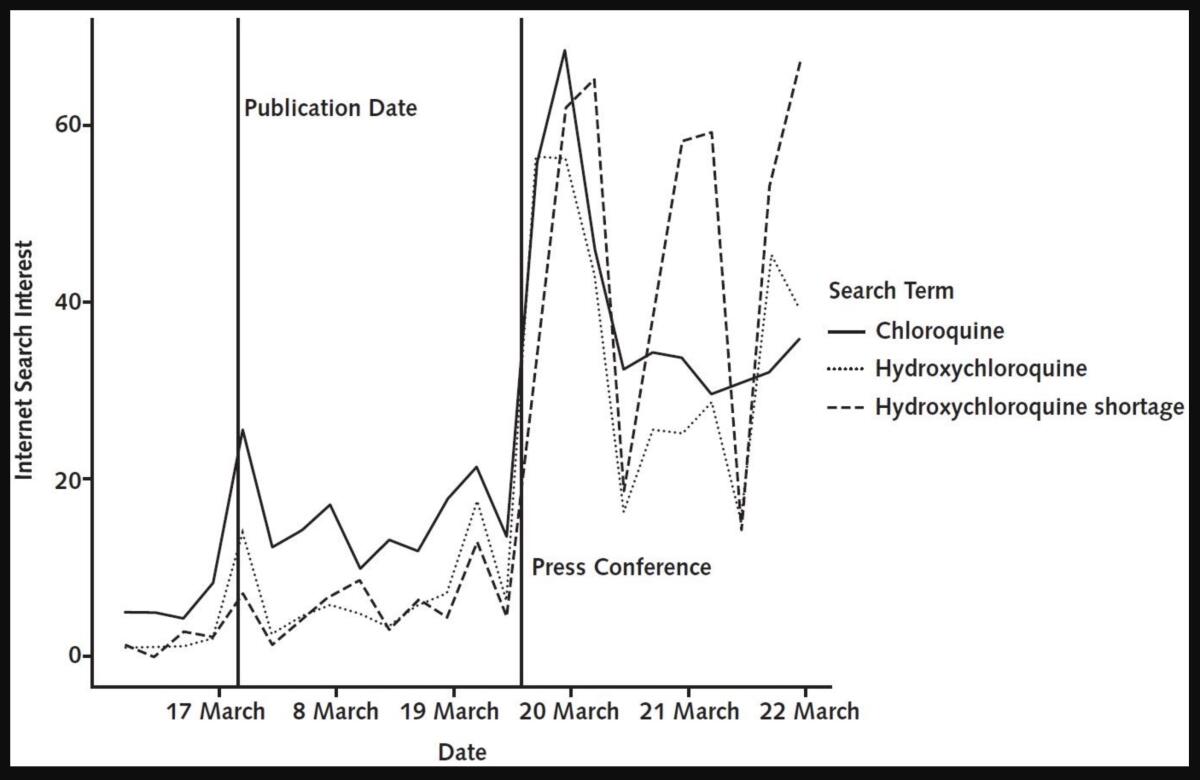
The craze has been pumped up, moreover, by figures who have a large public platform, including Trump and Dr. Mehmet Oz. Trump promoted Raoult’s claims about a drug cocktail containing chloroquine and the antibiotic azithromycin at a public briefing March 20 and tweeted about the drugs on March 21: “HYDROXYCHLOROQUINE & AZITHROMYCIN, taken together, have a real chance to be one of the biggest game changers in the history of medicine.”
Dr. Oz, a prominent heart surgeon whose television show is a platform for dubious health advice, interviewed Raoult on March 23 and subsequently discussed his research on Sean Hannity’s Fox News show. On the latter, he said Raoult had “shown he could get rid of the virus in six days in 100% of the patients he treated.”
That is not remotely true, as Raoult’s own published paper reveals. According to his paper, several subjects dropped out because they got sicker (one died), but he didn’t include their cases in his results. A follow-up study covered largely subjects whose infections were mild enough to be treated at home.

Annie Leutkemeyer of UC San Francisco discusses possible COVID-19 treatments. Her comments on chloroquine start at the 8:45 mark.
Other studies in the scientific literature have been inconclusive about the effect of chloroquine or found no effect. Oz did say on Hannity that a doctor should be involved in any decision to treat a patient with the drug, but he didn’t respond to a request for comment sent to his production company.
A review of the literature published by Italian and Israeli experts on March 10 concluded there were grounds to continue research, but only via supervised clinical trials or under close professional monitoring, and advised against its clinical use during the current pandemic.
Trump’s failures in the coronavirus crisis have been largely sins of omission: no planning, no organization, no leadership, with the result that the toll in the U.S. as these words are written has risen to some 185,000 reported cases, the most in the world, and more than 3,700 deaths.
Trump says he won’t cooperate with bailout oversight, so what is he hiding?
The chloroquine case is different. It’s a sin of commission. Trump has openly offered the public a false hope, or at the very least a completely unproven hope, while his words have led to a situation where legitimate patients have been deprived of what is in many cases a life-saving medicine.
Chloroquine is by no means a benign drug. It’s known to contribute to macular degeneration, which can cause blindness. Like other patients, Jennifer Herrera is required to be examined by an ophthalmologist every six months while she’s taking the medication.
It’s also known to cause heart problems in some cases. According to the French journal Le Point, these have already surfaced in France among patients treated with chloroquine. The French drug safety agency ANSM says it already has three deaths under investigation.
The drug isn’t recommended for diabetics, pregnant women or people with impaired liver function, among many others. Among its possible side effects are nausea, vomiting, cramps, headache and diarrhea.
Trump’s trumpeting of chloroquine may have encouraged at least one fatal outcome. As we reported, a Phoenix couple who heard Trump’s briefing took doses of a chloroquine preparation they had at hand to treat their fish tank; the husband died and his wife landed in critical condition before recovering.
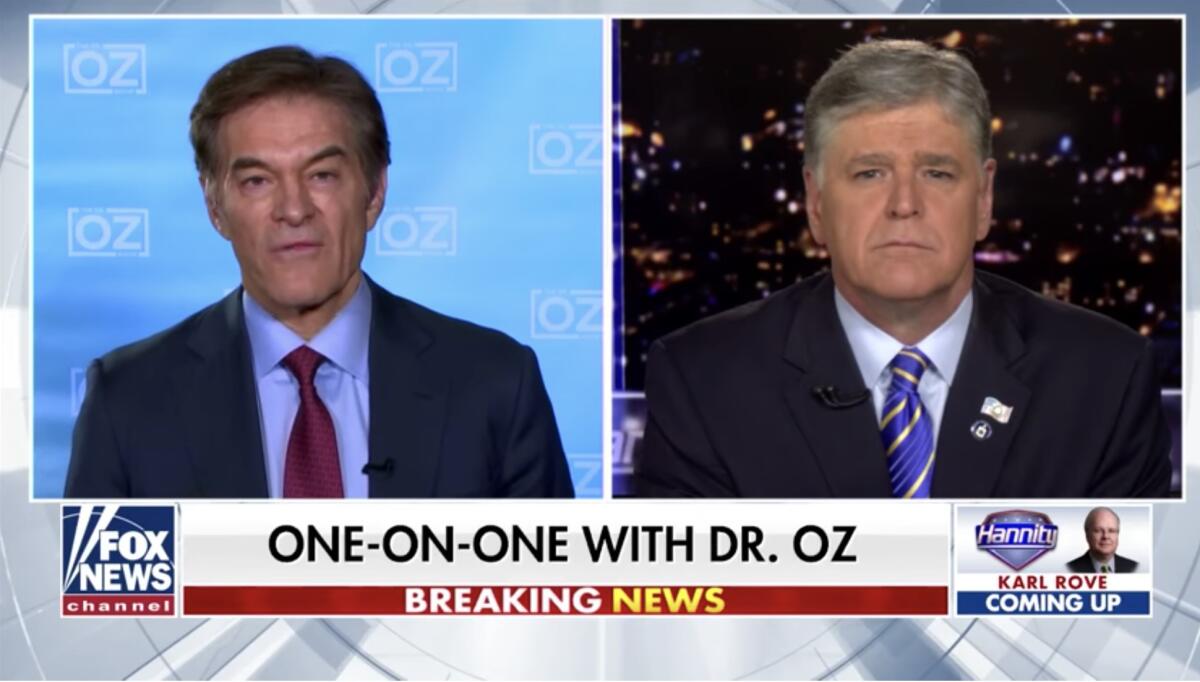
In the current atmosphere of panic and confusion, it’s up to our political leaders to offer hard, verifiable scientific information and solid advice, not ignorance.
Trump and ignorance have a symbiotic relationship, however. The bedrock of his career has been the exploitation of ignorance; in return, he has done his best to spread ignorance as widely as possible. In this case, Trump, who is not a doctor and doesn’t even play one on TV, could be doing real harm.
“Why is this happening?” says David Gorski, a physician who is a leading debunker of pseudoscience. “People are scared, for one thing. There’s also money to be made in terms of pushing a narrative of hope.... Dangling hope of an imminent cure helps distract from coverage of the Trump administration’s thus far disastrous response to the COVID-19 pandemic.”
The anti-government right wing Goldwater Institute is also enlisting the coronavirus panic and the unproven benefits of chloroquine in its long-term project to undermine the FDA, as it has done by promoting “right-to-try” laws that allow patients with terminal diseases to circumvent the agency in seeking unproven treatments.
Starting with President Trump, the GOP is calling to put millions at risk of contracting coronavirusso the stock market recovers.
It comes as no surprise that the Goldwater Institute has praised the FDA for issuing an emergency authorization for doctors to use chloroquine against COVID-19, despite the absence of solid evidence that it works. Make no mistake: This is merely the result of the political manipulation of the FDA, an agency that should operate purely on the basis of scientific evidence for the public good.
That brings us to Raoult. The politically well-connected researcher heads a Marseille-based medical institute known for its remarkably large volume of published papers. He casts such a large shadow in the French research community that many of his critics will only speak out anonymously, as the journal Science reported in 2012.
In 2006, however, the American Society for Microbiology banned Raoult and four of his co-authors on a paper from publishing in its journals for a year, after finding that some of the data appeared to be misrepresented. Two of the co-authors accepted blame for the errors, but the society said it was “not entirely comfortable with the explanation provided.”
Raoult called the punishment unfair, claimed he hadn’t even checked the submitted paper and labeled himself “a collateral victim of a collective sanction.” Raoult didn’t respond to an emailed request for comment.
Raoult is a climate change denier — “Climatic predictions are absurd,” he said in 2013, and “The Earth is no longer heating up” in 2014. He also expressed skepticism about the coronavirus in a video recorded at his institute in January. “The world has become completely crazy,” he said. “Three Chinese die, and that creates a worldwide alarm.... All that is crazy.”
In recent days, alarm about the economic impact of the novel coronavirus have turned conservatives who weeks ago were boasting about the shrinking of the U.S. government into raving Keynesians, proclaiming the virtues of deficit-financed economic stimulus.
That should provide some perspective on Raoult’s chloroquine research, which has been criticized in the scientific community for its methodology and claims.
Raoult’s initial paper — the one cited by Dr. Oz on Hannity’s show — involved 26 patients receiving hydroxychloroquine alone or in combination with azithromycin, and a control group of 16 receiving no treatment.
During the first six days of treatment, six patients fell out of the sample: One died, three were transferred to an intensive care unit, another left the hospital for unstated reasons, and the sixth couldn’t stomach the drug.
Those six results, however, were not included in the results, meaning that Raoult “cured” only 100% of those who didn’t get sicker, die, or leave the study.
“This is not how things are done,” Gorski observed. “These patients were obviously sicker.... Leaving them out of the final analysis was not justifiable.”
Raoult followed with another paper describing a study of 80 patients at a hospital associated with his institute, with no control group. But the 80 patients appeared to have very mild infections — only 15% had a fever, and four showed no symptoms at all.
Some experts say that using drugs such as chloroquine with potential anti-viral action on patients with mild symptoms or in early stages of the disease could be appropriate to keep the disease from progressing. But as Gorski says, patients with mild COVID-19 infections often recover without medical intervention, so it’s difficult to pinpoint the effect of Raoult’s treatment, if it has any effect at all.
Responsible scientists and government officials are doing what they can to hold back the tide of pseudoscience in the chloroquine affair.
Asked at the March 20 White House briefing if there was any evidence to suggest that chloroquine could be used against COVID-19, Dr. Anthony Fauci, the nation’s trusted authority in the current crisis, replied: “No. The answer is no.” The evidence being mustered thus far, he said, is “anecdotal.”
Anecdotes are not facts. Nothing that Trump, Dr. Oz, Sean Hannity, or Didier Raoult say can change that. But their efforts could cost lives.
More to Read
Inside the business of entertainment
The Wide Shot brings you news, analysis and insights on everything from streaming wars to production — and what it all means for the future.
You may occasionally receive promotional content from the Los Angeles Times.

